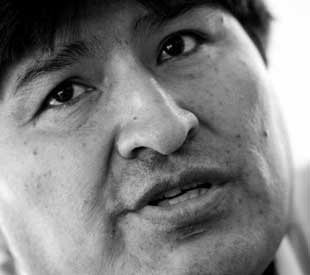
Washington in Full Force Against Evo
The face of crude violence which has escalated subversively in Bolivia, due to the revoking referendum, has already cost bloodshed among workers and has impeded the movement of President Evo Morales on important activities related to his seditious township agendas. The habitual challenge to constitutional order and the Presidential inauguration of separatist prefects and their fascists groups, has now been joined by protests by popular groups, whose leaders, especially those of the Bolivian Workers Confederation, give reason to suspect that their motives may be much more ominous then the infantilism of the left. Strictly speaking, the taste for violence and dynamite-based sabotage are objectively a part of the destabilizing plan of imperialism, during one of the most defining moments in the history of Bolivia.
What is at stake these days is too important, the quaking confrontation between the oligarchic elite and the people, because the outcome of next Sunday’s Revoking referendum could tilt decisively in favor of the transformation process led by Evo Morales, the current technical tie that exists between political forces. Such an outcome would be a serious blow to the plans of U.S. imperialism in Latin America, which seeks to destroy at all costs the main bastions of emancipatory current, which threatens to break its hegemony in the region.
Bolivia is one of those bastions because of the force of its popular-indigenous movement, the achievements of the government of Evo, his talent, their dedication and prestige. As a result of the crisis of legitimacy of parties and chieftains of the oligarchy, only the United States has drawn difficult cards to play against the constitutional president – in separatism, racism and regionalism, flying by a majority of departmental prefects and so-called civic committees, holdouts of internal latifundista colonialism, irritating privileges, hatred of Indians and of neoliberalism. And among them is no personal or political organization that could, even in the medium-term, win a national election against Evo Morales and the Movement for Socialism.
Thus, Washington has no means of regaining control over Bolivia and its natural resources except for unmasked subversion, as has been proven ad nauseam in the illegal actions and sedition of the prefects. But when the threat of imminent victory in the popular referendum was observed, it was decided to accelerate the destabilizing actions as the immediate, although not only, objective, to inhibit seriously and hold in open contempt democratic institutions.
For about a month it transpired that the U.S. embassy advised the six seditious prefects not to subject themselves to public opinion, knowing through their own surveys that most of them, an irreplaceable group against the project of transformation, would lose their posts if they were subject to the verdict of the polls while President Evo Morales and his vice Alvaro Garcia Linera would retain theirs with a copious vote.
The U.S. plan has come to involve an unusual deployment of economic power, media, culture and coercion, in support of the oligarchy and their nominees in the state apparatus, to damage the holding of the referendum on repeated legal pretexts and lies, combined with dangerous provocations of fascism, which did not succeed in triggering civil strife, only because of the nerves of steel of Evo, his governmental team and social movements.
Evo and the popular Bolivian indigenous movement-have already shown excellence in the art of defeating a rabid political right wing, and can bring crowds onto the streets if necessary.
They deserve all the confidence and solidarity at this critical hour.

Leave a Reply
You must be logged in to post a comment.